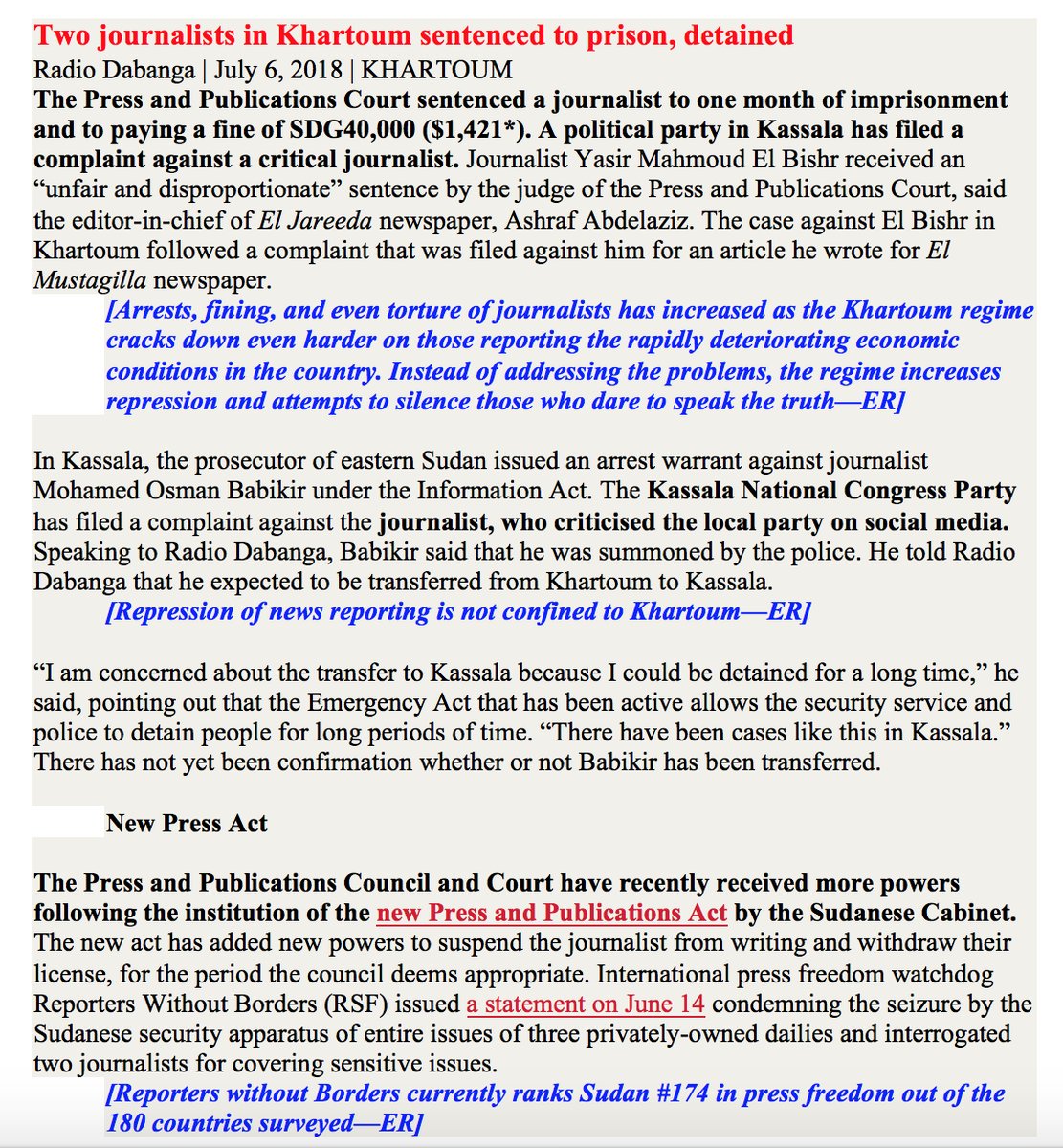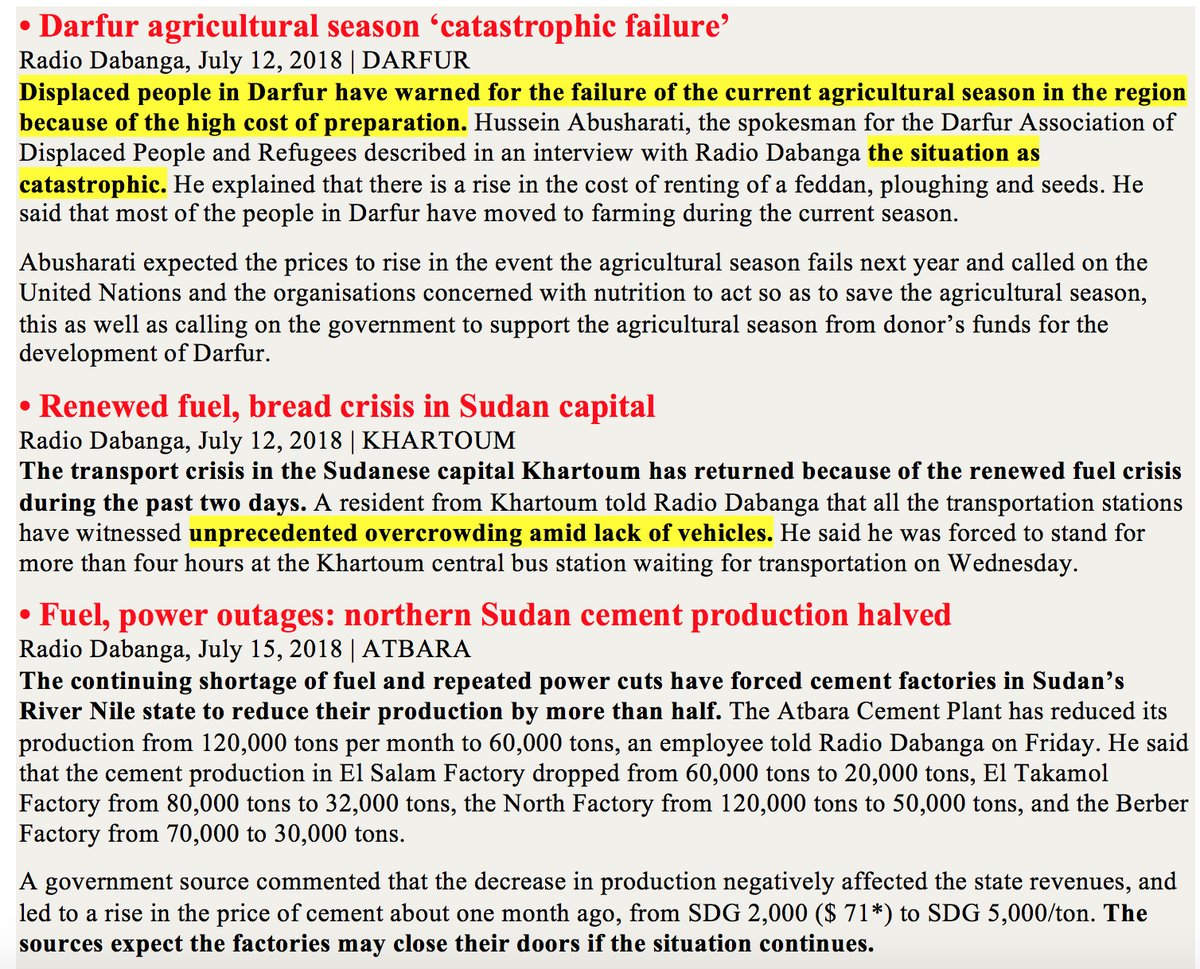A Compendium of Recent Brief Commentaries/News Dispatches on Economic Collapse in Sudan
Eric Reeves | July 7 – August 7, 2018 | https://wp.me/p45rOG-2gA
[see also | @SudanReeves on Twitter]
Today’s dispatch from Radio Dabanga offers an analysis of Sudan’s economy the portends the grimmest of futures for ordinary Sudanese: hyperinflation. Inflation in Sudan, year over year, is currently running at well over 100 percent, according to economics professor Steven Hanke of Johns Hopkins University’s, Director of the Cato Institute’s “Troubled Currency Project.” This is the second highest rate in the world, exceeded only by Venezuela’s rate (where domestic crises have entered an extremely dangerous phase). In the most basic sense, hyperinflation differs from ordinary inflation in that it feeds on itself: the expectation of more significant price increases encourages hoarding and present-time spending, driving up prices even faster. The cycle feeds on itself and inflation accelerates.
There is never a simple solution to hyperinflation because of the underlying causes that must exist to produce it in the first place. Those causes have long been in evidence in Sudan, but exceedingly poorly reported by international news organizations. What follows is a compendium of the past months’ reporting by Radio Dabanga and Sudan Tribune on what has been all too clear, even if judged unimportant by the international community. What stands out in these accounts is the tremendous hardships imposed by the regime-generated economic collapse on ordinary Sudanese.
There are notable increases in morbidity and mortality that can be traced directly to this collapse. There are critical shortages of vital medicines, which (if available) are so expensive that only the very wealthy and regime-connected population can afford them. Cholera is again emerging, and yet fearful of the stigma that attaches to the disease, the Khartoum regime refuses international assistance directly related to the disease and has no resources of its own (the UN’s World Health Organization refuses to test for cholera because of Khartoum’s resistance). Water shortages are very often the direct result of the inability to import sufficient quantities of refined petroleum products (i.e., diesel fuel with which to run water pumps). The lack of clean water makes water-borne diseases even more common (including cholera). Bread is frequently in short supply, if not available for purchase at all. Bread lines are commonplace even in Khartoum.
These shortages reflect the extreme depletion of foreign exchange currency (Forex), making key imports impossible. The continuing plunge in value of the Sudanese Pound in relation to the U.S. dollar reflects a loss in confidence in Sudan’s currency, which in turn makes imports even more expensive, since no exporting country will accept payment in Pounds. This inflation devalues the Pound further, and once again it is clear how vicious a circle is created by runaway inflation.
Ultimately, as all economists recognize, this creates a political crisis and now an almost total loss of confidence in the Khartoum regime. The regime in turn increases its repressive measures, particularly the censoring of domestic news reporting on the economy, generating more political anger and frustration, driving people to more and more protests. Yet again, there is a vicious circle that will end only with the demise of the National Islamic Front/National Congress Party regime. Western nations that continue to support the regime for reasons of narrow self-interest are ignoring the larger effects in Sudan of this misguided support. International institutions such as the International Monetary Fund are equally culpable of enabling the regime. An apt example is provided by the IMF’s Edward Gemayel: “Mr. Edward Gemayel, the IMF’s Mission Chief for Sudan, noted that ‘Sudan has a long track record of implementing sustainable economic policies'”(IMF press release, October 12, 2013). This was deeply misguided at the time, and has provided catastrophically destructive assistance to the regime.
Until the international community takes seriously the accelerating collapse of the Sudanese economy and the responsibility of the current regime (now in its thirtieth year of power and full control of Sudan’s economy), ordinary Sudanese will continue to suffer and die in greater numbers.
[For a brief analysis from February 2018, see | https://wp.me/p45rOG-2dt ]
Sudan airlines raise domestic ticket prices; hyperinflation expected | Radio Dabanga, August 7, 2018 | KHARTOUM
Airline companies in Sudan have announced an increase in domestic flight prices by more than 20 per cent by August 6. Economists fear hyperinflation in the near future.
The airlines pointed to an increase of 23 per cent, caused by the rising fuel prices since end December, and the indicative US dollar rate which the Bank of Sudan raised twice this year. Economic analyst and former banker Hafiz Ismail confirmed that the ticket price increase is linked to the rapidly dropping value of the Sudanese Pound. “The shortage of hard currency is pushing the Dollar rates against the Sudanese Pound on the parallel market to unprecedented levels,” he told Radio Dabanga. “This makes business quite unprofitable for airlines, as they have to cover the expenses of fuel, spare parts, and other operating costs in hard currency.” The economist expects that many international companies may reduce their flights to Khartoum in the future because of the continuing fall of the Pound and the rapid increase in ticket prices.
“No stabilization”
“As long as Khartoum does not take any serious measures to remedy the economic crisis in the country, I do not see any possibility for the stabilisation of the Sudanese Pound rate at the moment,” Ismail explained.
[NB:] He warned that Sudan may soon enter the stage of hyperinflation.
“In the past, the government used to resort to temporary solutions by obtaining cash reserves from friendly countries, which is not possible any more. Borrowing is also out of the question because Sudan’s credit page is far from clean,” he said. “In addition, productive sectors such as agriculture and industry are suffering from fuel shortages, which makes it very hard to produce enough for the export which brings in hard currency.” According to the former banker, the economic malaise is a reflection of the political crisis in the country. “The economy cannot be cured without comprehensive political reforms.”
He said that the Sudanese have become paralysed. “People do not have enough money to meet their simple needs such as sufficient meals, rent, or medical treatment, as the money and stocks are located abroad. They are now focussed on surviving only.” The inflation rate rose to 63.86 per cent in June. Following new increases in the prices of food and other basic consumer goods in Sudan in mid-July, economic analysts began to warn for an imminent economic collapse.
Austerity measures
End 2017, the Sudanese government decided on a package of austerity measures in an attempt to address the huge gap in its finances. Its priorities did not change: more than 70 per cent of its spending is still allocated to the defence and security sectors, less than 10 per cent will be spent on health and education.
The custom duties were raised by more than 200 per cent – which immediately affected the prices of most of the goods in early January. The government further decided to liberalise the flour market which lead to the doubling of the bread prices. The indicative exchange rate of the Sudanese Pound against the US Dollar [set by the regime—ER] was devalued twice, in early January from nearly SDG 7 to SGD 18, and in early February to nearly SDG 30. Yet, the US Dollar rate in the parallel forex market which settled at SDG 30 in January began to rise again in February, and reached SDG 46 in mid-July.
Due to the combination of major tax increases and the fall of the Sudanese currency value, prices of locally produced commodities like meat, milk, and vegetables are now increasing continuously.
Previous dispatches/commentary:
August 6, 2018: Examples are everywhere of morbidity and mortality in Sudan directly related to a collapsing economy: a lack of Forex prevents the import of critical medical supplies, yet more evidence of gross mismanagement by the Khartoum regime, which still functions as a ruthless kleptocracy:
August 2, 2018: The grim consequences of extreme inflation and the lack of Foreign Exchange Currency (Forex) with which to finance imports are now highlighting the gross incompetence of the Khartoum regime in managing Sudan’s economy. Agricultural failure will affect countless ordinary Sudanese: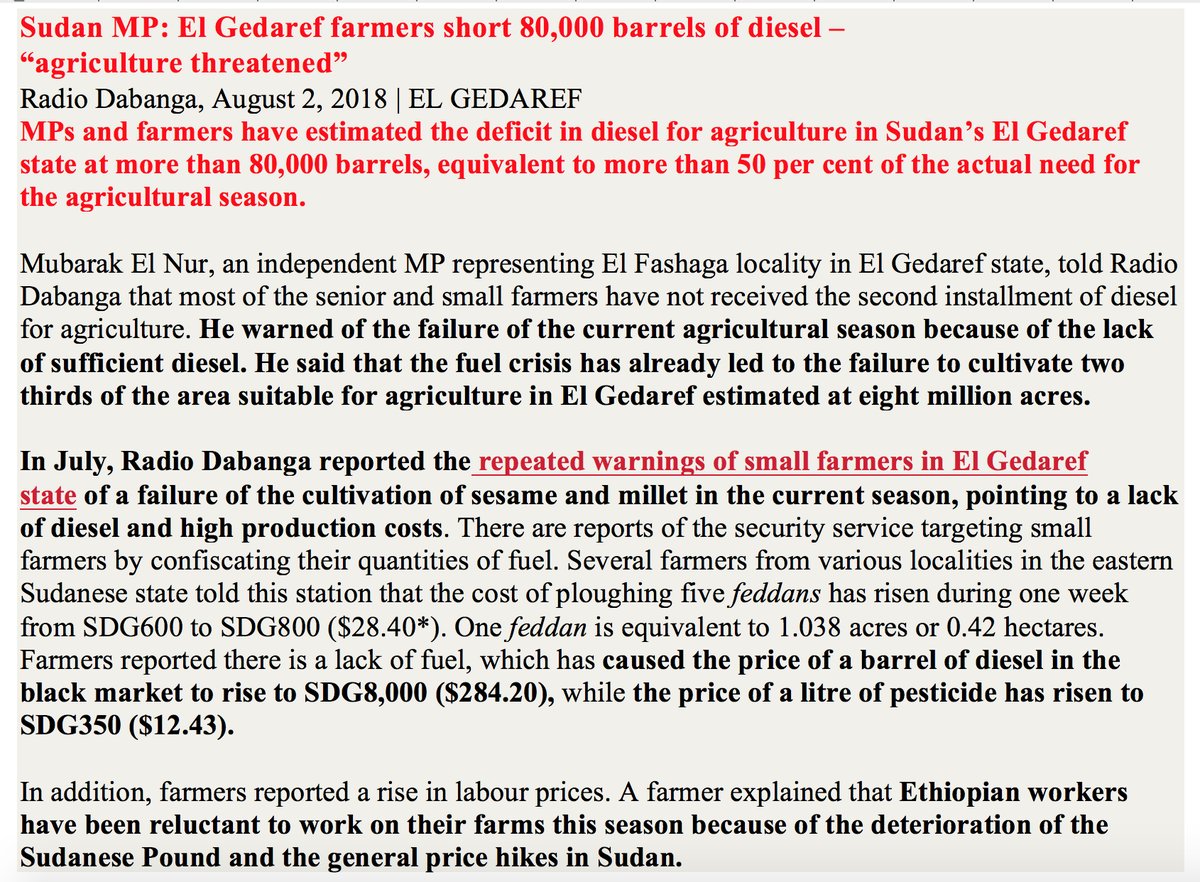
August 1, 2018: The financial destruction of independent news reporting in Sudan is now the clear goal of the Khartoum regime as the economy continues to collapse and protests become more widespread. If necessary, the regime will resort to violent repression of the sort seen in September 2013: 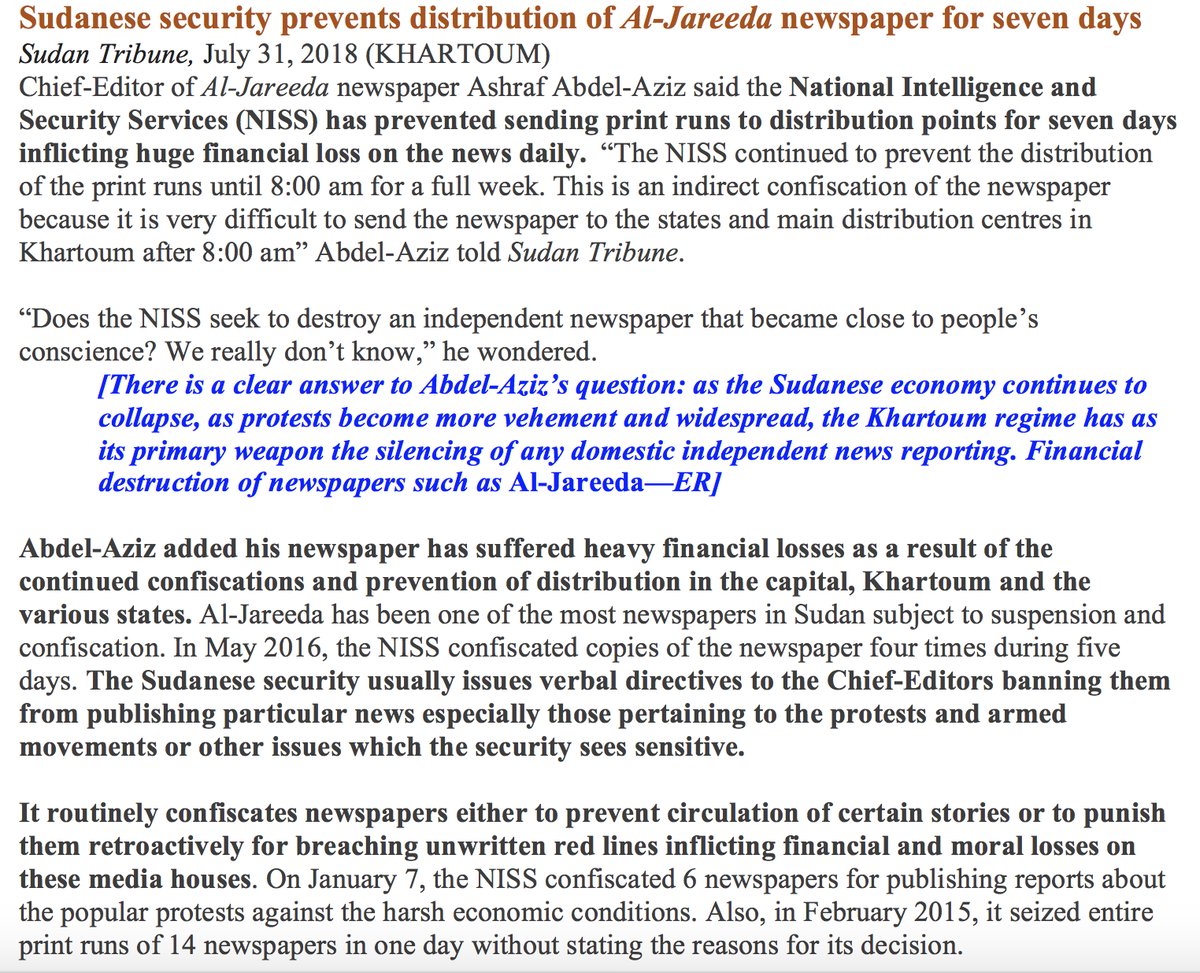
July 31, 2019: Economic collapse in Sudan is not an abstract reality but the source of acute deprivation and suffering for a vast part of the population. Rising food prices have led to malnutrition and declines in schooling. Morbidity and mortality are also increasing dangerously. Inflation kills: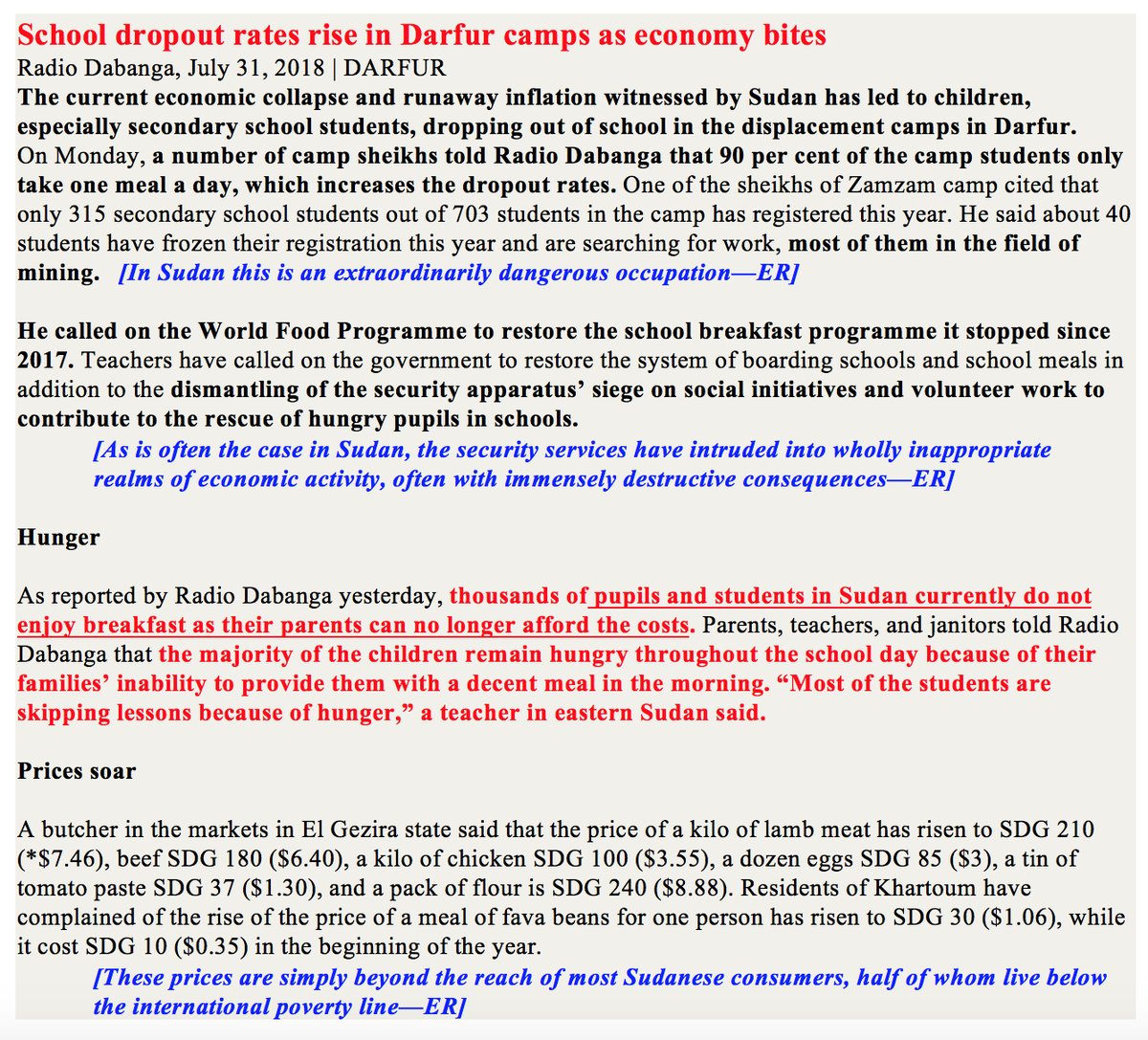
July 27, 2018: Cholera in Sudan: now the height of the rainy season; massive shortages of clean water/adequate sanitation in the country; clear evidence of resurgent cholera—and yet the UN’s World Health Organization still refuses to test for the disease, fearing anger of the Khartoum regime: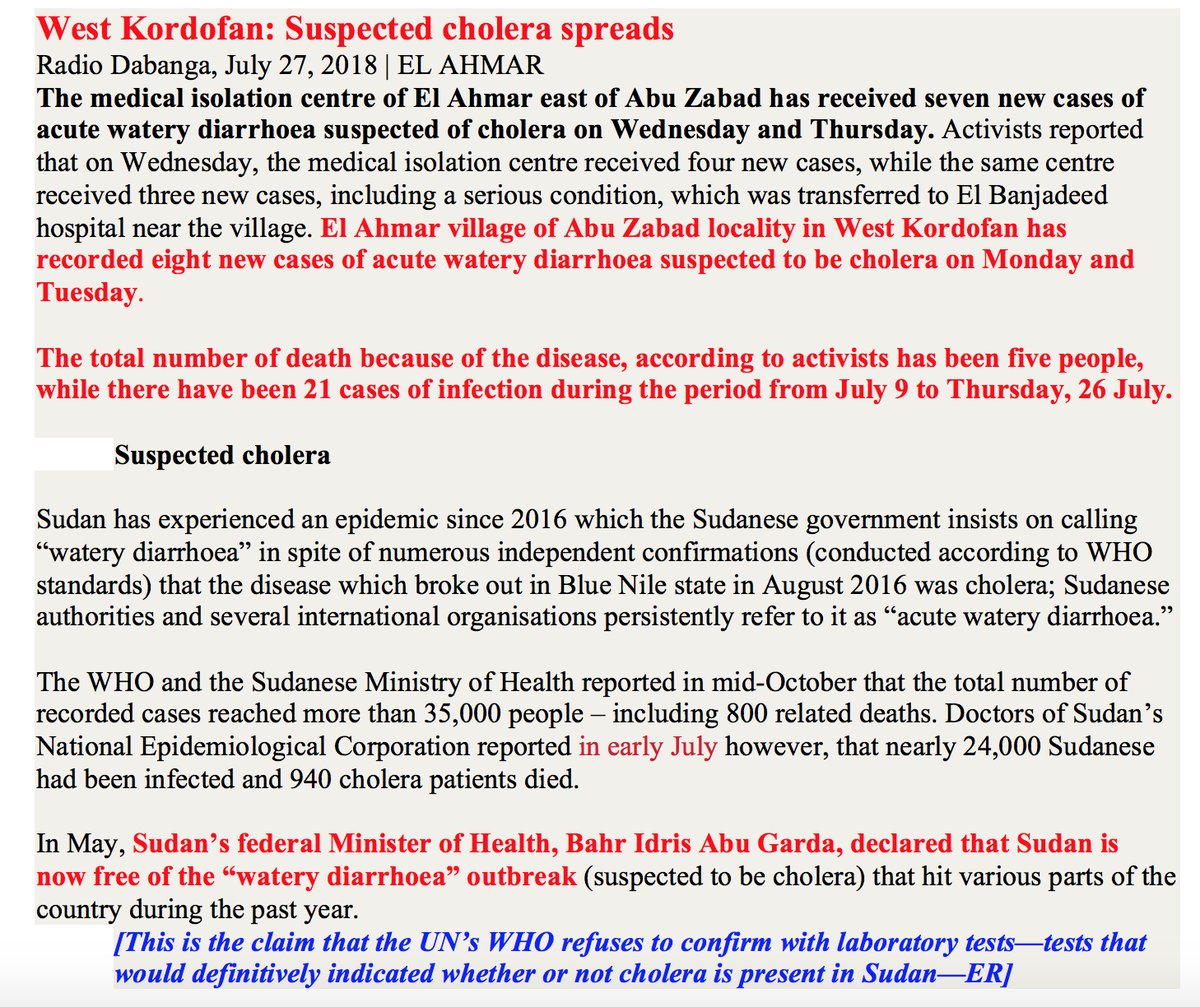
July 26, 2018: The NIF/NCP regime in Khartoum has a long history of censoring the news: controlling all broadcast media and punishing newspapers that print inconvenient truths. But censorship has accelerated dramatically as the regime seeks to keep Sudan’s people ignorant of economic realities: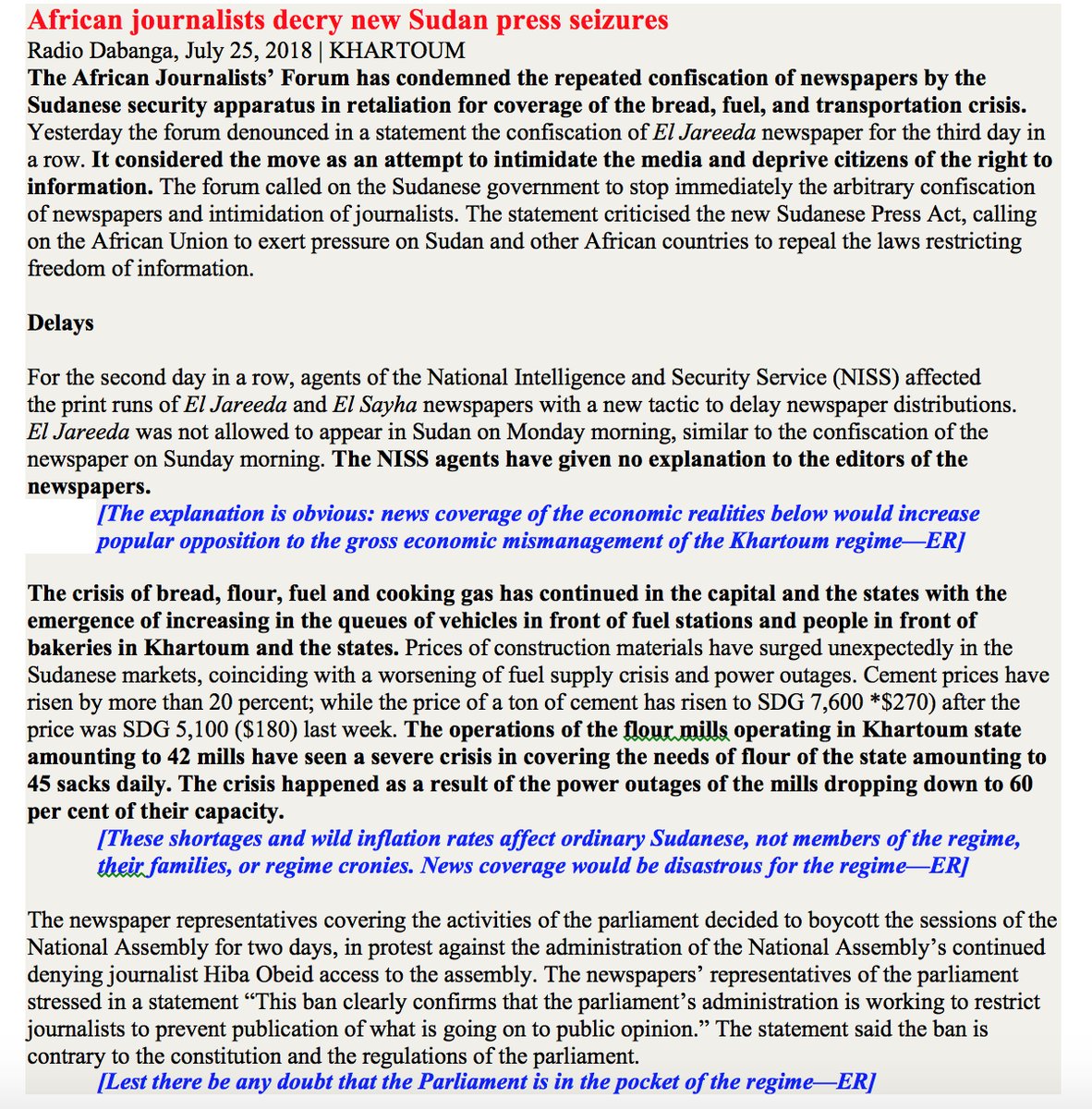
July 24, 2018: New and strong evidence that cholera is resurgent in Sudan. Intimidated by the Khartoum regime, the UN World Health Organization refuses to test (and release results of tests) for cholera. WHO Director-General Tedros Adhanom Ghebreyesus may be contacted at | info@drtedros.com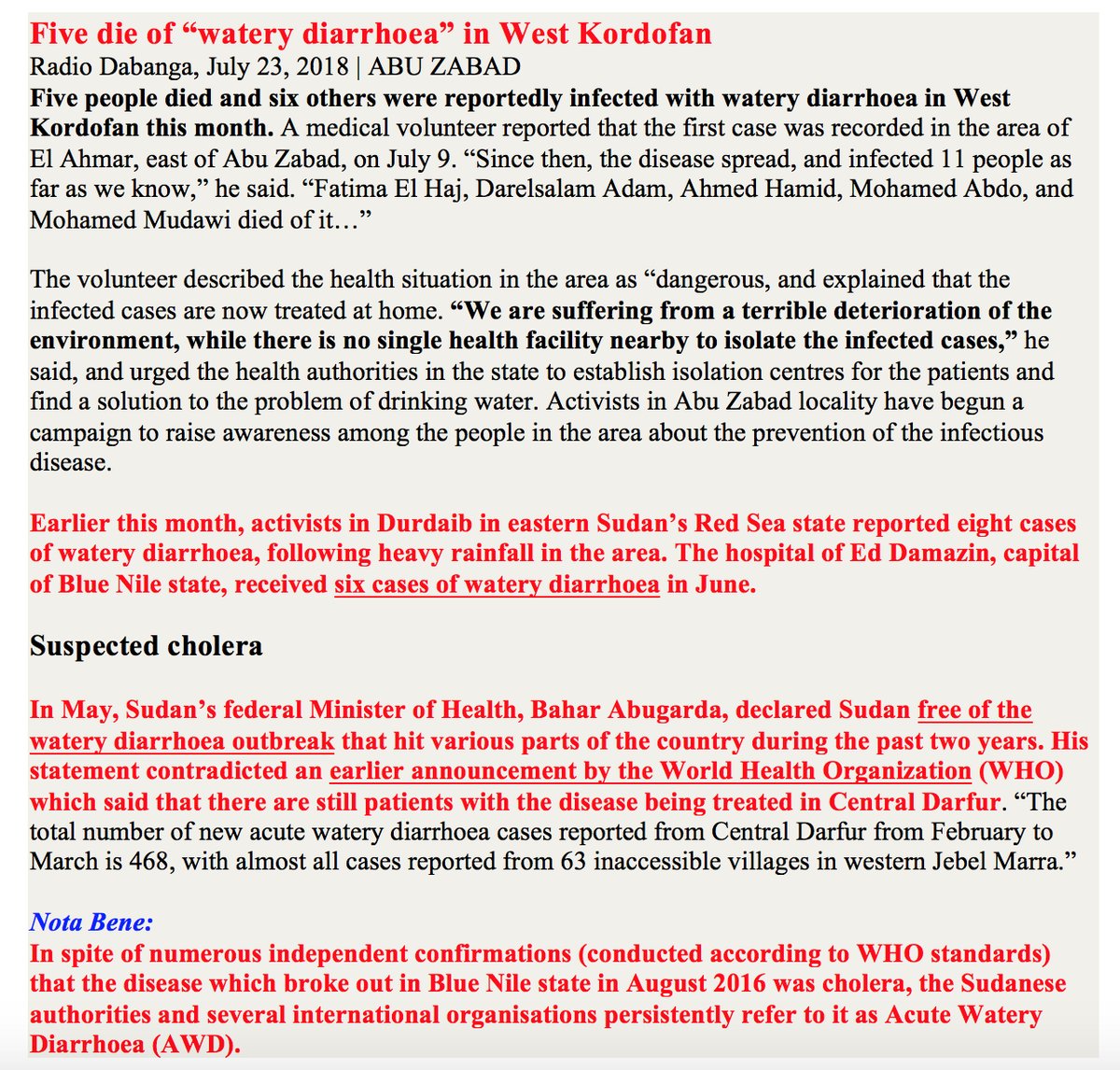
July 22, 2018: The economic catastrophe threatening Sudan draws closer by the day. Yet international neglect, indifference, and cynicism ensure is nothing being done to slow the downward collapse of the Sudanese economy. Today’s lead dispatch from Radio Dabanga provides a superb overview: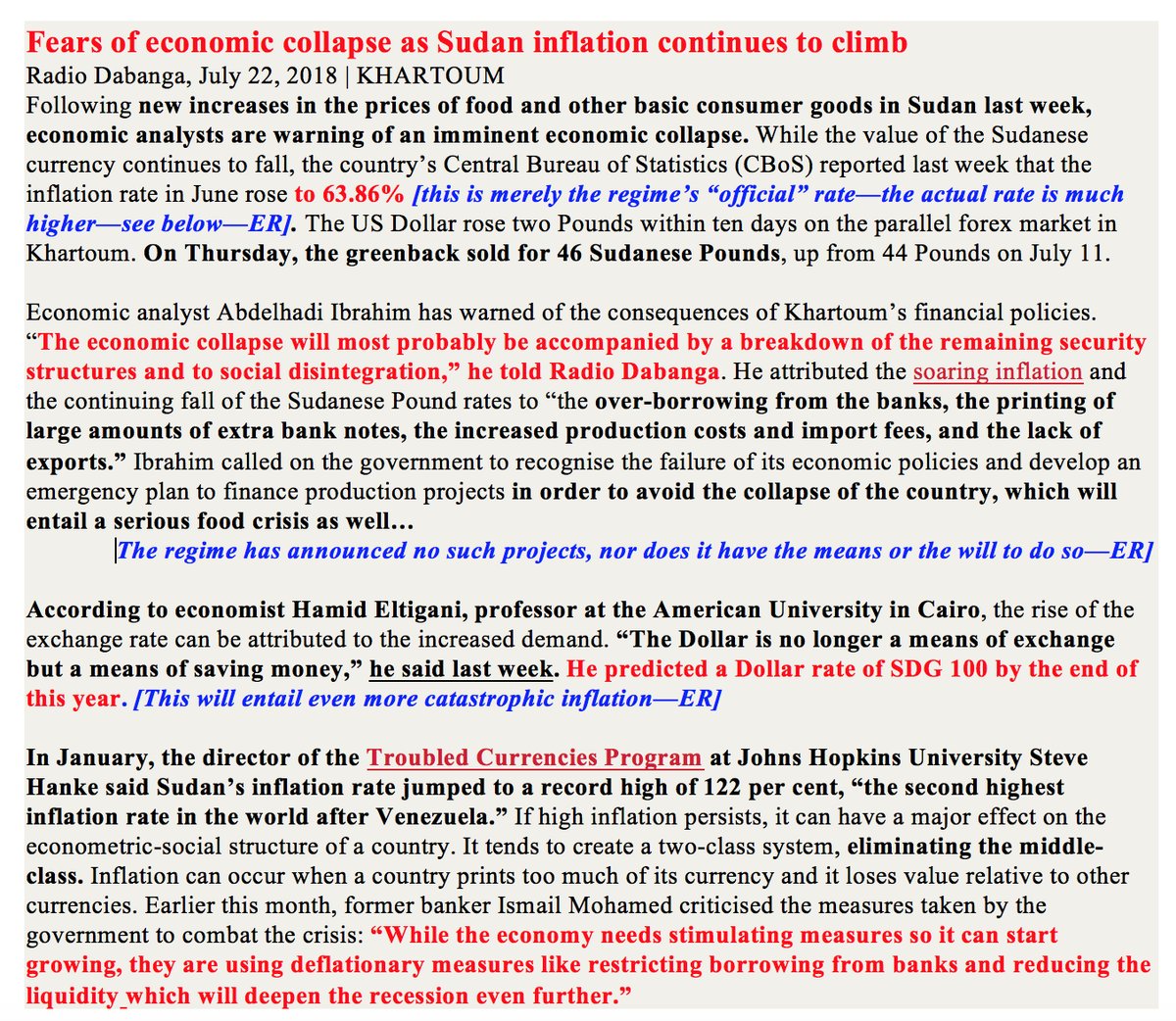
July 21, 2018: The international community has long failed to assess Sudan’s economy with integrity and honesty, and international news coverage has been negligible. But the realities misrepresented or ignored are causing tremendous deprivation and suffering–and mortality–throughout Sudan: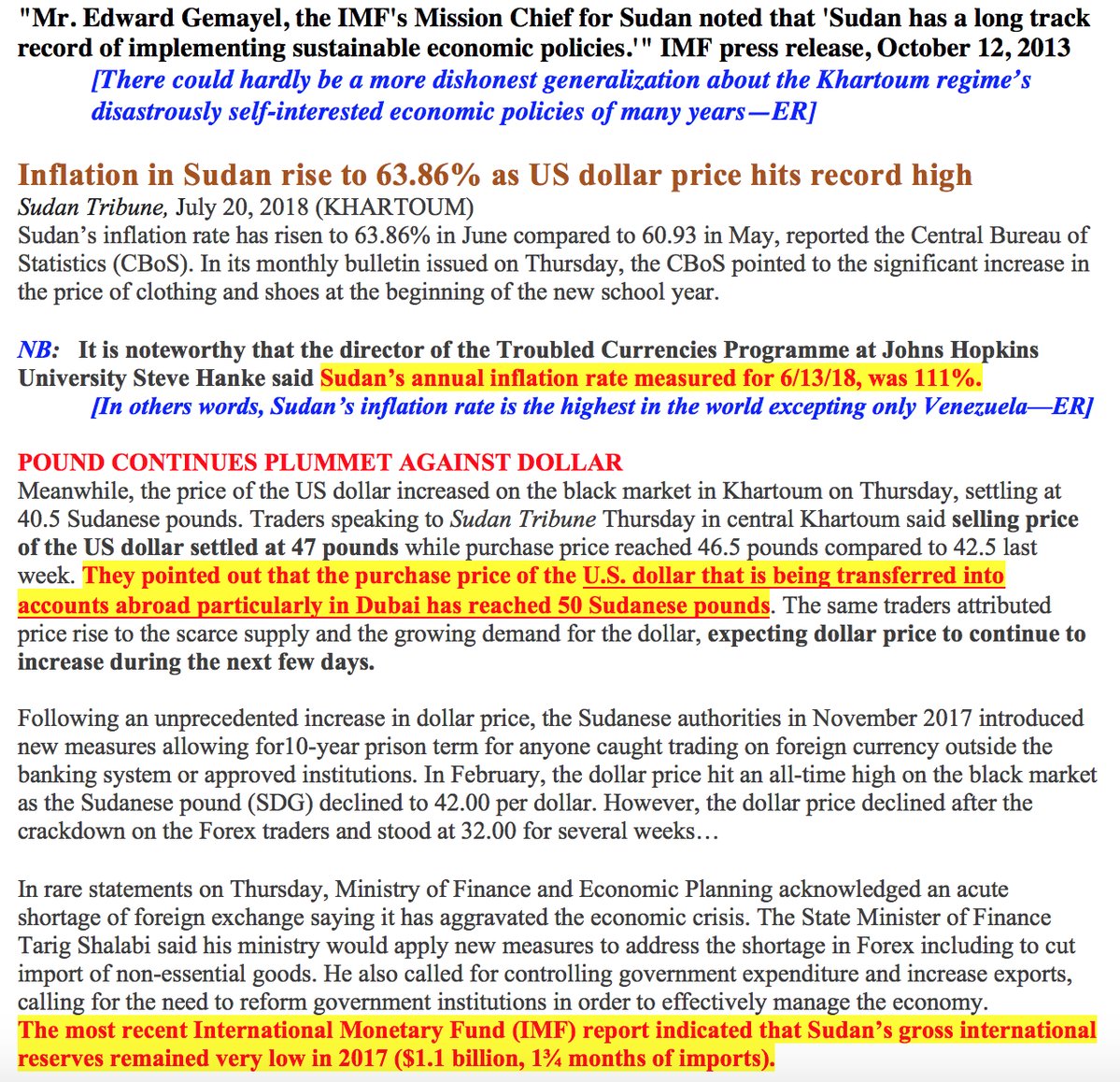
July 19, 2018: The Sudanese economy continues to implode without significant int’l news coverage. But the vast crisis, affecting all of Sudan, is causing increasing suffering and political unrest. Only a change in regime by the people of Sudan can lead to a reversal of economic fortunes: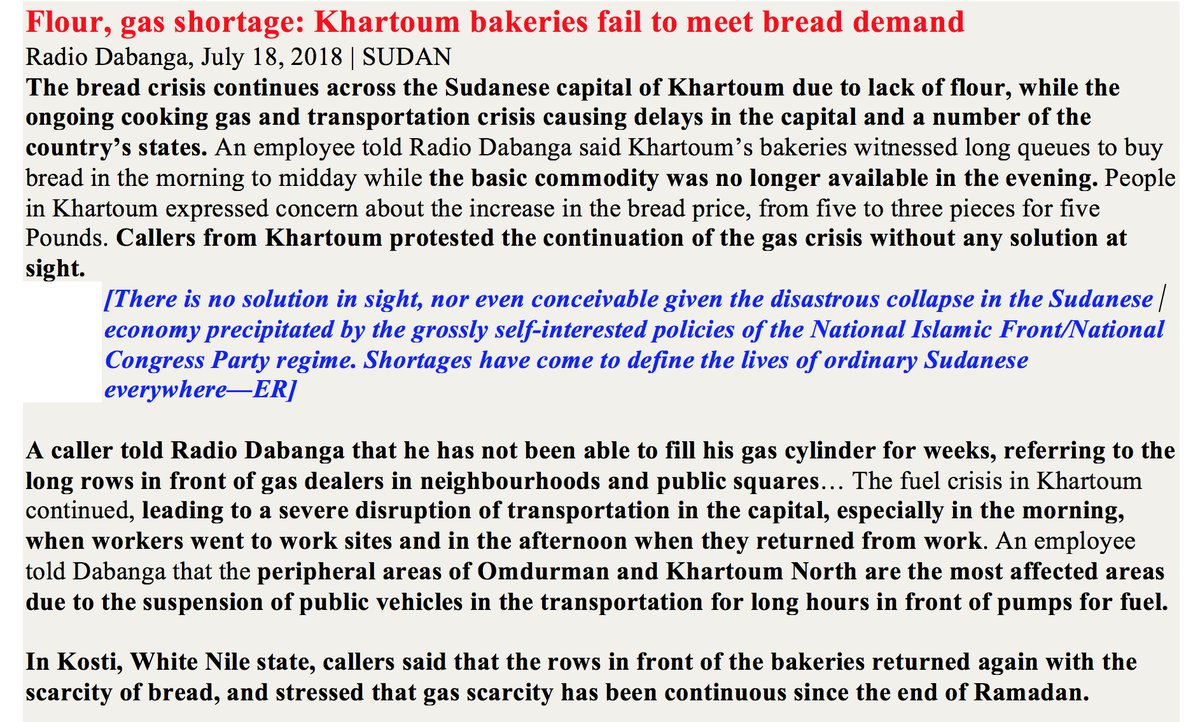
July 17, 2018: Sudan’s economic collapse continues, fueled by self-serving policies of NIF/NCP regime and international indifference. This collapse will cost countless lives and livelihoods, and shows no sign of slowing. Rather, news of past week reveals clear acceleration, fueled by lack of Forex: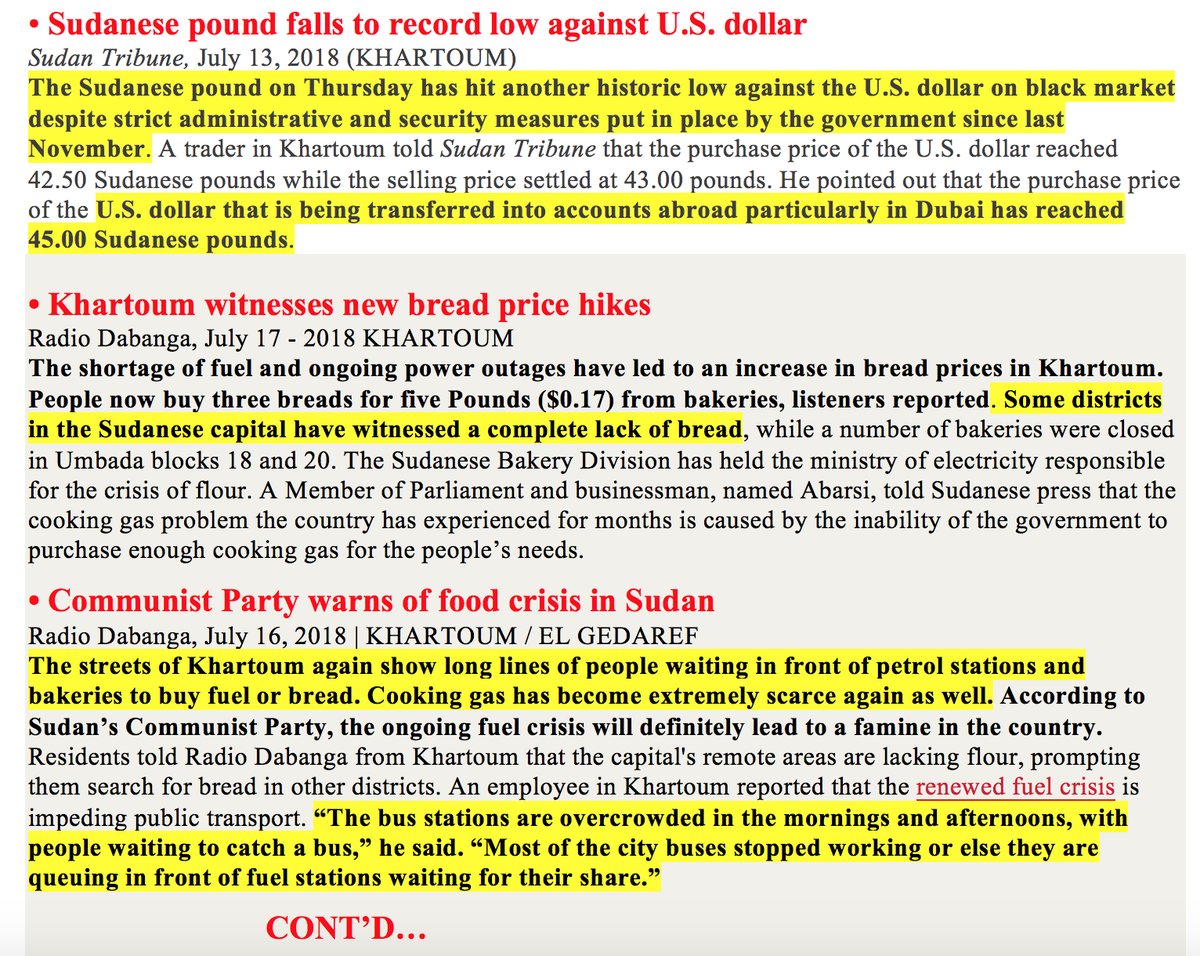
July 15, 2018: The people of Darfur are being destroyed by Sudan’s collapsing economy and its effects on agriculture, as well as by the failure of the international community to address seriously the inability of displaced non-Arab persons to return to their lands and villages. Famine looms: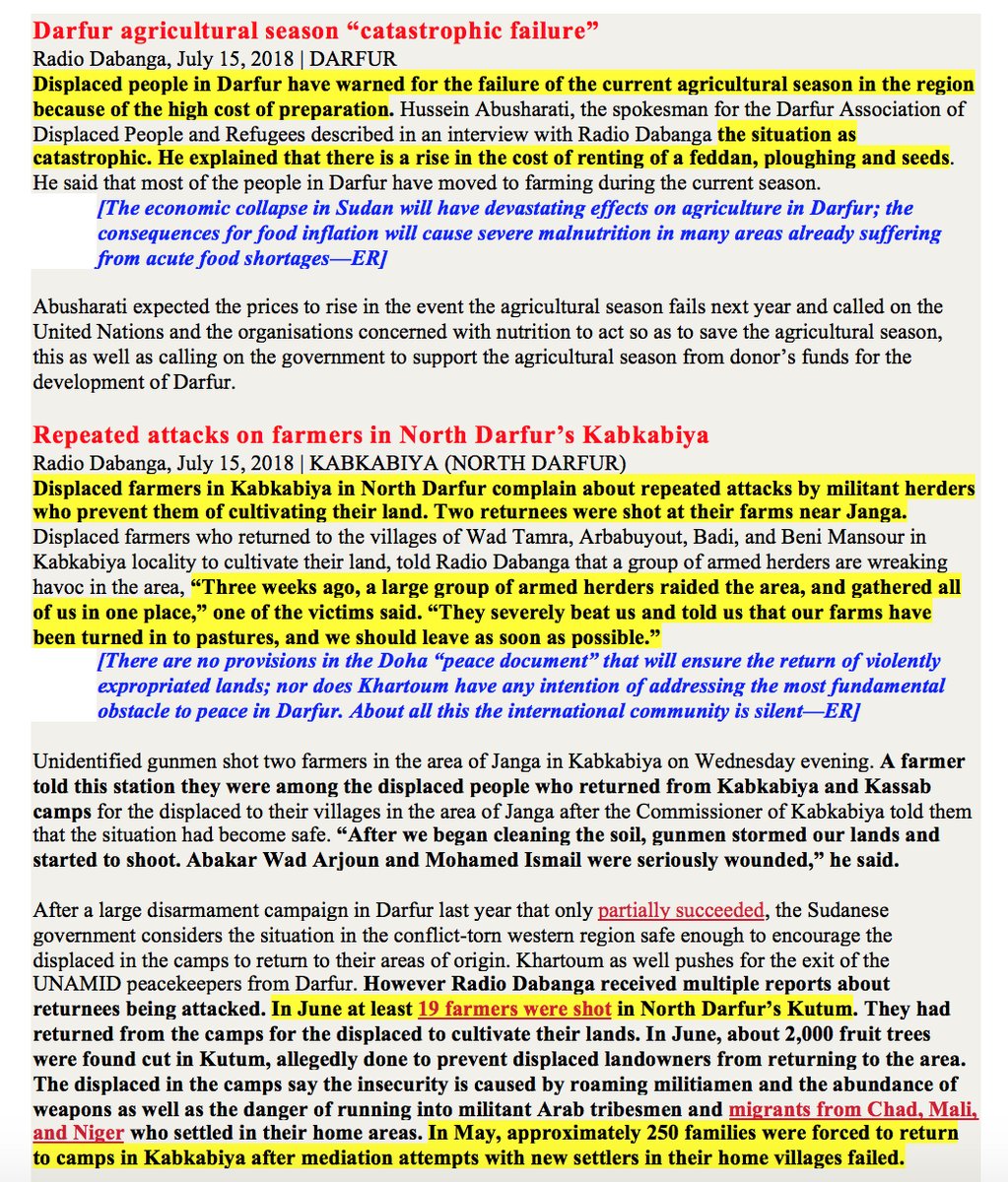
July 13, 2018: As the people of Sudan suffer from a collapsing economy–including acute shortages of food, water, fuel, and medicines—ICC-indicted génocidaire Omar al-Bashir and 26 cronies jet off to watch the World Cup Final, held in another kleptocratic autocracy, Russia. Simply obscene:
July 12, 2018: “Cholera Again Looms in Sudan and the WHO Seems Poised to Remain Silent,” Eric Reeves | July 19, 2018 | https://wp.me/p45rOG-2gd 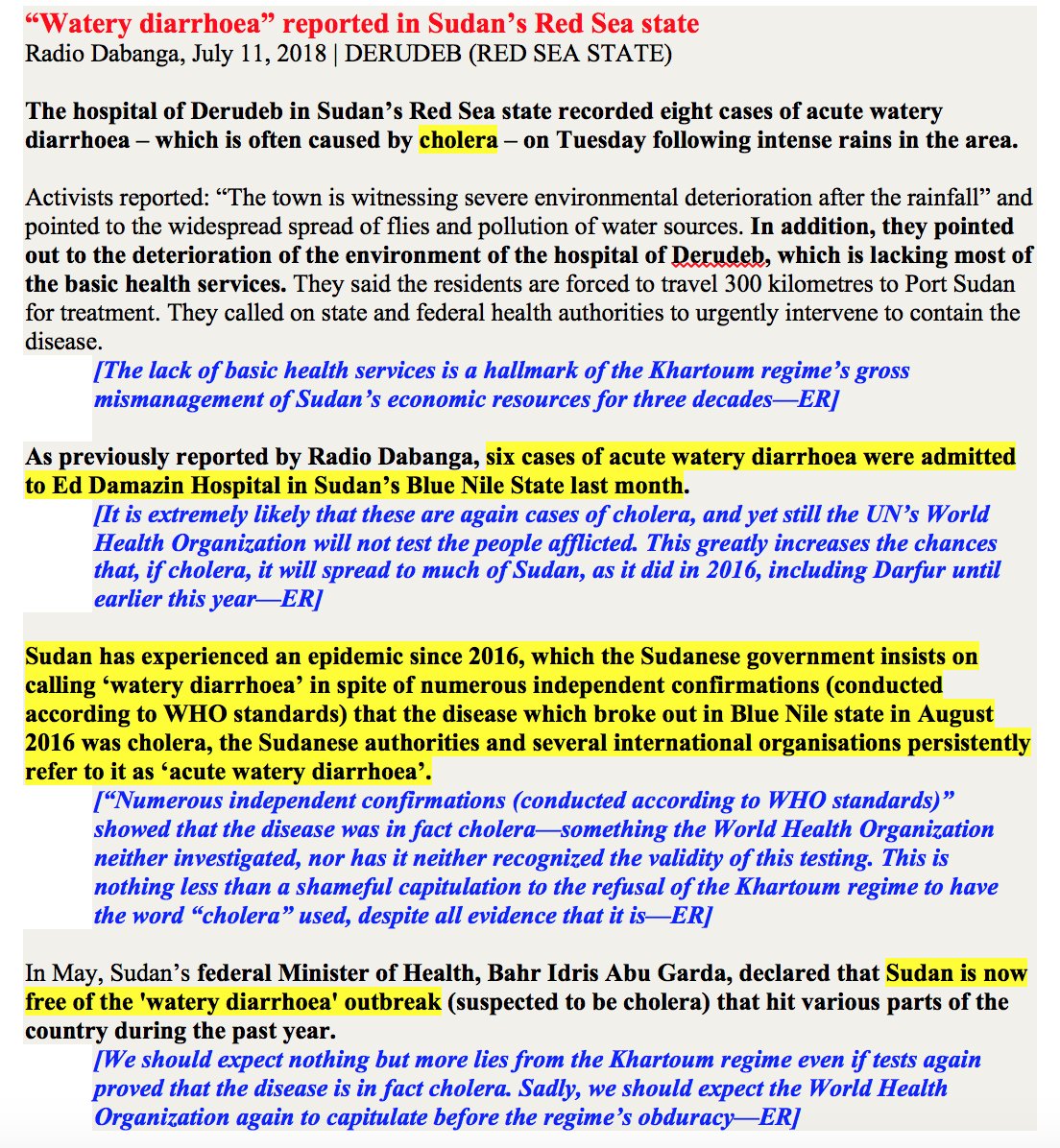
July 10, 2018: Besides massive inflation in the prices of medicines, there are critical shortages throughout Sudan—both are a function of gross mismanagement of the economy by the NIF/NCP regime. The regime has no plans or means to reverse the downward economic spiral; the world doesn’t care: 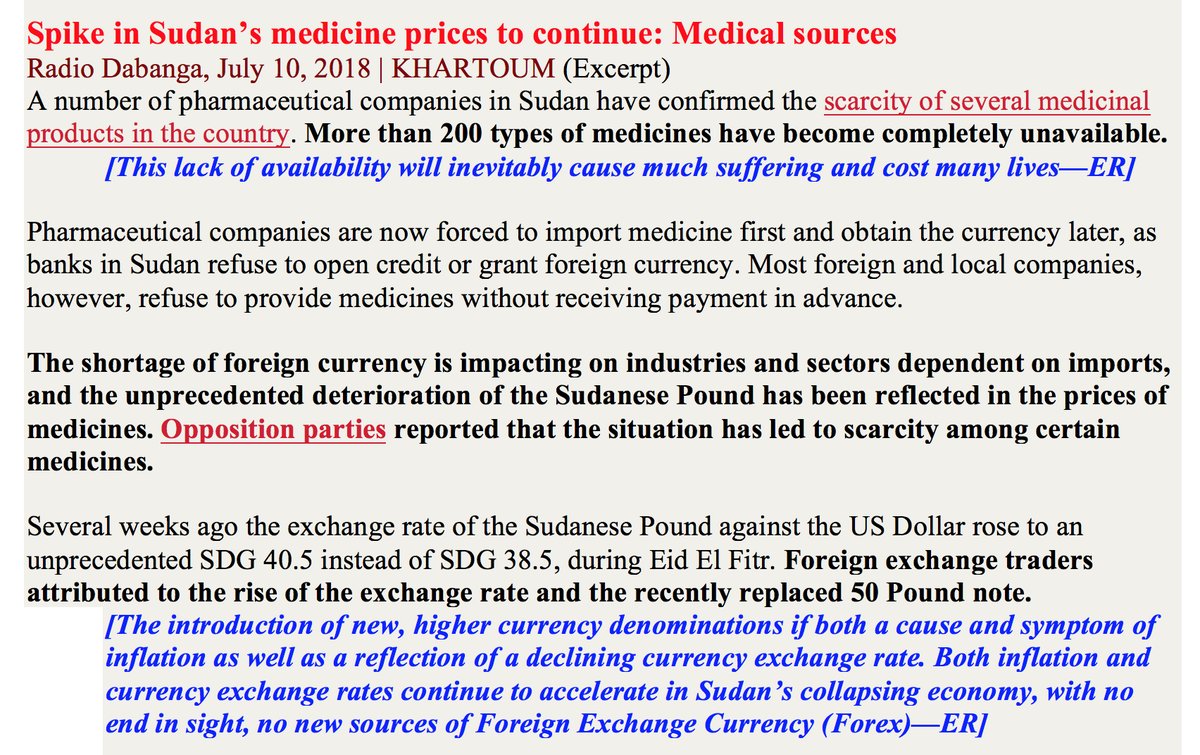
July 7, 2018: The Khartoum regime’s response to economic collapse in Sudan is increasing and brutal repression aimed at journalists daring to report the truth about conditions. This makes it all the more important to support Radio Dabanga and its extraordinary journalism: https://bit.ly/2zeP8Jz 